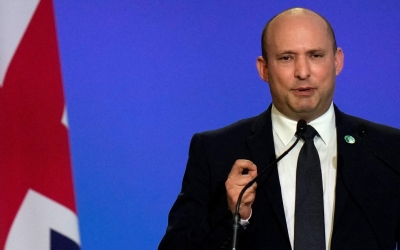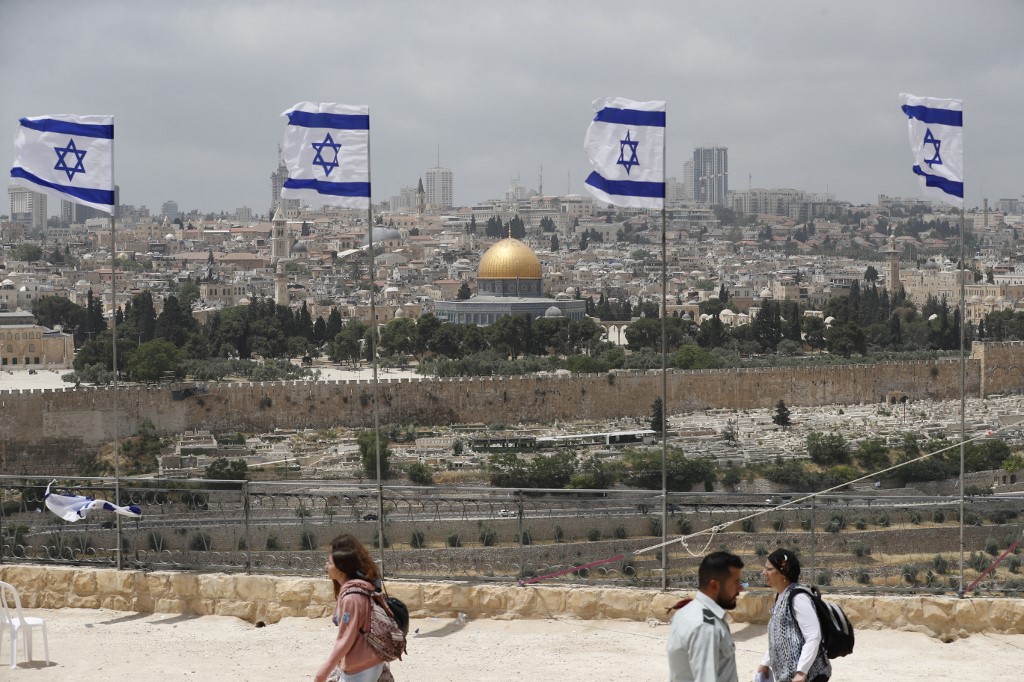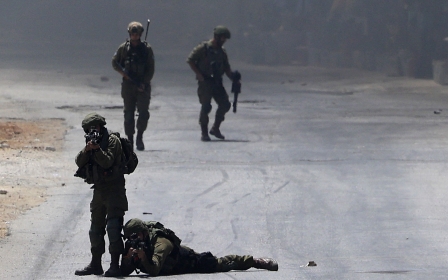Why Israel's leaders and allies are in a state of panic over its future

Panic about the survival of the European Jewish settler colony of Israel is striking at the hearts of European neocolonial powers, as well as the white settler colonies.
The increasing sophistication of the Palestinian and Lebanese armed and unarmed resistance, the growth of the solidarity movement in western countries, the consensus of western human rights groups about the apartheid nature of Israel, and the expansive reach of alternative media exposing Israeli crimes have all been important if uneven factors in inducing this panic.
The panic felt by these European powers - and the EU itself - along with the United States has resulted in a push to criminalise criticism of Israel
In the face of such threats to the survivability of Israel, the UK, the major architect of the Jewish settler colony since the First World War, declared this week in its Queen's speech opening of parliament that it would ban local councils and other public bodies from participating in boycott and divestment campaigns.
In Germany, the most anti-Palestinian European state (and there are many contenders for the title), the state-owned broadcaster Deutsche Welle recently purged at least seven of its Arab staff for allegedly criticising Israel, while France has banned marches that criticise Israeli crimes and invasions.
The panic felt by these European powers - and the EU itself - along with the United States has resulted in a push to criminalise criticism of Israel as part of a major encroachment on free speech in these supposedly “liberal-democratic” countries.
New MEE newsletter: Jerusalem Dispatch
Sign up to get the latest insights and analysis on Israel-Palestine, alongside Turkey Unpacked and other MEE newsletters
The efforts at criminalisation base themselves on their adoption of the International Holocaust Remembrance Alliance’s (IHRA) 2016 definition of antisemitism as inclusive of the “targeting of the State of Israel” or of describing it as “racist” in nature.
The IHRA is an intergovernmental organisation whose 34 member countries are exclusively European or white settler colonies, including Israel.
Threats to Israel's survival
Former Israeli general and prime minister, Ehud Barak (né “Brog”, son of Lithuanian colonists), has recently expressed his worry that Israel, founded in 1948, might not reach the ripe old age of 80. Former Prime Minister Benjamin Netanyahu (né Mileikowsky, son of Polish colonists) expressed his fear five years ago that Israel might not reach 100.
Both Barak and Netanyahu cited the demise of the ancient Israelite state in Palestine, which existed for a mere eight decades, as the basis for their fears.
Israel remains the most formidable military force in the Middle East. It successfully set up a quisling Palestinian regime in 1993 to help it crush Palestinians who resist the colonists and has subdued most of its neighbours by concluding “peace” agreements with them. It has also gained US recognition of its illegal occupation and colonisation of Jerusalem and the Golan Heights. So why this worry about its future survival?
Could it be Palestinian and Lebanese resistance, with their increased armaments and military sophistication, which threaten that survival?
This is not, however, what Barak and Netanyahu would have us believe will doom Israel in the next six, or 26, years.
Barak expressed his fear that the “curse of the eighth decade would befall” present Israel. That modern Israel was named after its ancient homonym is one of the reasons for the parallel drawn between the fate of the ancient state and the current settler colony.
While the debate about what to call the state preceded the November 1947 UN Partition Resolution, no decision was made despite the many proposals, which included Judea, Zion, Yeshurun and Eber. The name “State of Israel” was accepted in April 1948 and officially adopted on 12 May that year by a committee that included David Remez (a Byelorussian who went to Palestine in 1913 at the age of 27).
The choice of what to name the state is said to have been first proposed by the Ukrainian Aharon Shimshelevitz, later “Reuveni” (1886-1972), brother of Yitzhak Ben Zvi (Israel’s second president), who came to Palestine in 1910.
Calling the country “the State of Israel” (or “Medinat Yisrael” in Hebrew), wherein “Israel” (which was the name given to the biblical Jacob after he struggled with the angel of God), refers to the Jewish people, considered to be Jacob’s descendants, was a deliberate choice.
Ancient history
The coiners refused to call it “the Land of Israel” (Eretz Yisrael), as that would be confusing since the state then was going to be established only on part of the so-called “Land of Israel”. The name of the state would facilitate the Zionist tarnishing of anyone who opposed the “State of the Jewish people” with antisemitism in the decades to come.
It remains most perplexing that in the mind of Israel’s leaders, it is the very name of the state that will doom it in the near future.
Note that neither Barak nor Netanyahu think that what modern Israel has done since 1948 is what will doom it in the near future, nor that Palestinian and Lebanese resistance is what endangers it, but rather it is the fantastical parallel they draw with ancient history that may seal the fate of the settler colony.
But if history is any guide, the future of Israel in the next six or 26 years will most assuredly be no different from its past. Israel will continue to colonise the land of the Palestinians; to murder, expel and oppress them for daring to defend their lands and lives against its colonial theft.
Israel will also continue to repress all forms of Palestinian resistance. It will continue to justify all its colonial crimes by appealing to the Holocaust as justification, and will continue to brand and defame all those who criticise its depredations as antisemites.
Dire predictions
Israel will continue to intensify US imperial sponsorship, to create imperial regional alliances, to aggress against its neighbours, including Lebanon and Syria, and distant Iran, and will continue to claim that its predatory aggression is no more than its “right to defend itself”.
But Palestinian and Lebanese resistance are determined to continue their efforts to check Israel’s colonial aggression and will likely become even stronger and better-equipped than they are today.
If all of this will doom Israel’s future, and there is good reason to believe that it could and should, it is not going to take some type of recent, novel crimes to end this horrific colonial chapter in the history of the Palestinians and other Arabs.
Rather its end will come from the persistence and continuation of the very same colonial practices that Israel has instituted since 1948 and which Zionist ideology called for since the late 19th century - and the Palestinian and Lebanese resistance they fostered over the decades. Most assuredly, the reason for Israel’s demise will not be down to some historical repetition, or based on the choice of its name, or any such nonsense.
These Israeli dire predictions are, of course, also a cynical move on the part of Barak and Netanyahu, as they are engineered to produce panic among Israel’s Jewish colonists and stifle whatever meagre local opposition exists in the country, thereby lining up the Jewish colonists behind their state.
The predictions are also engineered to induce panic among Israel’s supporters and allies in Europe and the white settler colonies, so that they provide more financial, military and diplomatic support and cover. These countries’ adoption of the IHRA definition is part of this strategy.
Real panic
The fear of continued international exposure of Israel’s crimes, however, has caused real panic in the Israeli leadership.
It led this week to the assassination (or, more accurately, execution) of the prominent Palestinian journalist Shireen Abu Akleh (whom I had the privilege of meeting once in 2002 at the home of Edward Said), Al Jazeera’s most articulate and superlative correspondent in Palestine, as she was covering one of their many criminal raids on the Jenin refugee camp.
The response of the European colonial powers and the US was, as always, one of circling the wagons, Boer-style. The US expressed “sadness”; the EU did not seem particularly “sad”. Both showed a determined reticence to assign any blame to the murderous Israelis.
That Abu Akleh was a US national is as much of a concern for the Americans as was the elderly Palestinian-American man who died after being beaten by Israeli soldiers in January.
The question is not simply about the hypocrisy of US and European reactions to the situation in Ukraine versus their reactions to colonial crimes in Palestine, but over their continued commitment to preserving the Jewish settler colony for the foreseeable future.
This is a future that the Palestinian and Lebanese resistance and international solidarity continue to imperil and jeopardise. Given these real and imagined dangers, Israeli and western optimisation of efforts to safeguard Israel’s colonial future remains a priority.
On this 74th anniversary of the Nakba, predictions of the future demise of Israel may not be greatly exaggerated, although Europe’s and the US’s futile commitment to preventing such an eventuality certainly is.
The views expressed in this article belong to the author and do not necessarily reflect the editorial policy of Middle East Eye.
Middle East Eye delivers independent and unrivalled coverage and analysis of the Middle East, North Africa and beyond. To learn more about republishing this content and the associated fees, please fill out this form. More about MEE can be found here.









